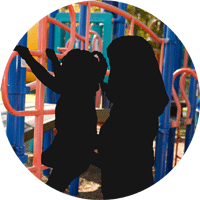 Starting in 2001, Solid Ground began sending staff members through a transformational training created by the People’s Institute for Survival and Beyond called Undoing Racism® (UR). Today, all of our permanent, full-time staff are required to attend. The workshop takes place over two intensive, eight-hour days. Participants learn the history of racism in the US and reflect on how that legacy continues to play out in our society and institutions.
Starting in 2001, Solid Ground began sending staff members through a transformational training created by the People’s Institute for Survival and Beyond called Undoing Racism® (UR). Today, all of our permanent, full-time staff are required to attend. The workshop takes place over two intensive, eight-hour days. Participants learn the history of racism in the US and reflect on how that legacy continues to play out in our society and institutions.
The UR training also hits deeply personal chords, and each individual takes away different learnings based on our racial/ethnic and socioeconomic background, gender, age and life experiences. As human service providers, the training helps us examine the connection between racism and poverty, and identify ways we can work to remove some of the barriers people face in accessing our services and other community opportunities.
Undoing Racism & the Solid Ground community
A wide spectrum of the Solid Ground community participated in the UR workshop in December 2012, including: line staff and managers from all of Solid Ground’s various locations; a Board member who once served as an AmeriCorps Member through Solid Ground; current AmeriCorps Members who also have accessed Solid Ground services; and our agency’s two top leaders – Gordon McHenry, Jr., President & CEO, and Sandi Cutler, COSO (Chief Operating & Strategy Officer). The People’s Institute welcomes past workshop attendees to retake UR for free – so some of us were experiencing it for a second or third time, while for others, it was a first.

Roshni Sampath, Grant Writer
Grant Writer Roshni Sampath joined Solid Ground in July 2012 and was drawn to the agency, in part, because of our stated anti-racism values. This was her first UR training.
She says, “One of the nicest things about going through the training was that it felt like I was getting on the same page as other people in the organization – despite our roles and our location – and it made me really value and appreciate the need for all new staff to go through this. But what made it stronger was that returning staff were going through it – that there was a real mixed group.”
The UR training helped bring clarity, which Roshni says is “one of the hardest things to feel when trying to talk about race and analyze it. My head gets cloudy. It’s almost like I’m seeing the blueprint of a city from up top, and it’s clear, and then the clouds roll in, and I can’t remember what I just saw, even if I just saw it.”
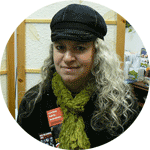
Liz Reed Hawk, Web Administrator & Publications Specialist
I joined Solid Ground in 2001, and my current role is Web Administrator & Publications Specialist. As a college-educated white woman from a middle class background, the UR training gives me a basis to understand that I have access to opportunities and unearned privileges – and that these benefits affect how I walk in the world and impact those around me. UR gives me tools to begin to examine my privilege so I can attempt to use it to undo instead of reinforce oppressions.
As a part of Solid Ground’s Communications team, I need an awareness that my learned dominant culture perspective is not the end-all, be-all. I want to be held accountable for the way I communicate about our work and how I share people’s stories. I recognize the delicate balance between helping to give voice to someone who may feel disenfranchised versus “exploiting” or invading someone’s privacy in the name of telling a powerful story to benefit Solid Ground. UR has taught me to question both my own motives and how I approach my work.
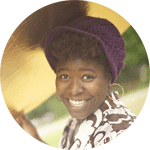
Senait Brown, Community Organizer, Statewide Poverty Action Network
For the past three years, Senait Brown has been a Community Organizer with the Statewide Poverty Action Network. She says, “One goal in going through these trainings is trying to reach what they call ‘your growing edge,’ the place where you feel uncomfortable,” so you can move beyond it to make change. Since this was Senait’s second time attending UR, she wasn’t sure where her growing edge would be. She hit it, she says, “…when we started talking about the organizing component of doing anti-racism work. We’re not doing organizing work if folks aren’t able to stand on their own when we’re gone.”
Senait feels we need to “stop saying that we’re going to empower somebody else; we don’t have the ability to do that. They have to empower themselves. I have to create opportunities for people to learn, to be prepared for when they’re going to organize themselves. They’re going to come to the table on their own, on their own terms.”
This lesson really hit home during the Dec. 2012 UR thanks to the active participation of two Washington Reading Corps (WRC) AmeriCorps Members who also live in Solid Ground’s permanent housing at Brettler Family Place. These confident women gave candid feedback about their experiences as Solid Ground “clients” who are now giving a year of service to the agency, and how they have struggled to assert their voices and self-determination along the way.
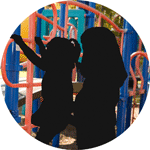
“Penni,” a Washington Reading Corps (WRC) AmeriCorps Member
“Penni” (who originally shared her story in On an upward continuum, Nov. 2011) is now in her second year as a WRC AmeriCorps Member, and has taken the UR training several times. She says, “Given the opportunity, I would retake this training every year. It offers a space to have conversations about racism in a way that challenges everyday thinking, stretches our perspectives, and builds community from a place of revolutionary love – something that I truly believe we can never have enough of.”
Penni describes what the training means from her vantage point: “Being a white woman working in a nonprofit serving primarily students of color, and also being a white mother to two biracial children, I have to not only be aware of my whiteness [i.e. privilege], but also understand it and where it comes from, how it manifests, and what I need to do and understand about myself in order to undo those manifestations that perpetuate the cycle of racism.”
Applying Undoing Racism Principles in our day-to-day work

Mona Bayyuk, Seattle Housing Stabilization Services Case Manager
Originally from Jordan, Mona Bayyuk moved to the US with her family as a teenager. She was just a few days into her Case Manager position with Seattle Housing Stabilization Services when she attended UR. She says, “It was definitely a huge eye opener, because although I had attended diversity courses in both my undergrad as well as graduate studies – and discussed as well as addressed the implications of being from a minority group and the effects of racial profiling – we never addressed ‘race’ and its impact on individuals.
“As a social worker with a passion to serve those who struggle with inequality and unjust systems, it never occurred to me that I too was contributing to these systems, because as one of the trainers mentioned, in my position I play the role of a ‘Gate Keeper.’ This training is very relevant to my work at Solid Ground, because I will always serve and work with individuals from diverse ethnic backgrounds who are struggling to overcome various barriers that are beyond their control and prevent them from accessing their basic human rights.”
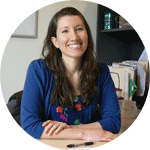
Samantha Dyess, Apple Corps Program Supervisor
For Samantha Dyess, Program Supervisor of the Apple Corps program since June 2012, “My biggest ah-ha moment was in our discussion on dissecting program implementation. I realized how we – meaning social service agencies – implement programs is racist when we don’t include the community in the decision-making process. Attending UR had a significant effect on me, both personally and professionally. All at the same time I felt angry, sad, paralyzed and motivated. But mostly I felt awakened – as if my memory had suddenly returned after years of forgetting.”
Samantha adds, “I feel that the workshop is of utmost importance to my daily work here at Solid Ground. From my personal interactions with staff and clients, to programmatic decisions, this workshop has helped me align my values and establish priorities for my program. I can now really begin to view everything my program does through an anti-racist lens.”
Roshni sums up the importance of UR Principles in simple terms. “These ideas,” she says, “we live our lives in them.” And I have to agree with her: Undoing racism is never done; it’s a lifelong process that embraces and affirms our humanity if we choose to embrace and commit to the work.
Filed under: Undoing Racism & Oppressions | Tagged: anti-oppression, anti-racism, People’s Institute for Survival and Beyond, social justice, Undoing Racism & Oppressions | 3 Comments »















